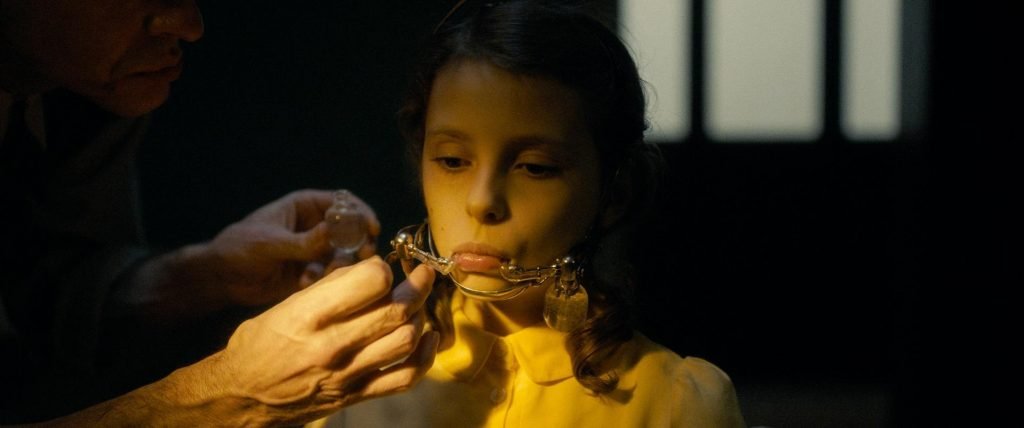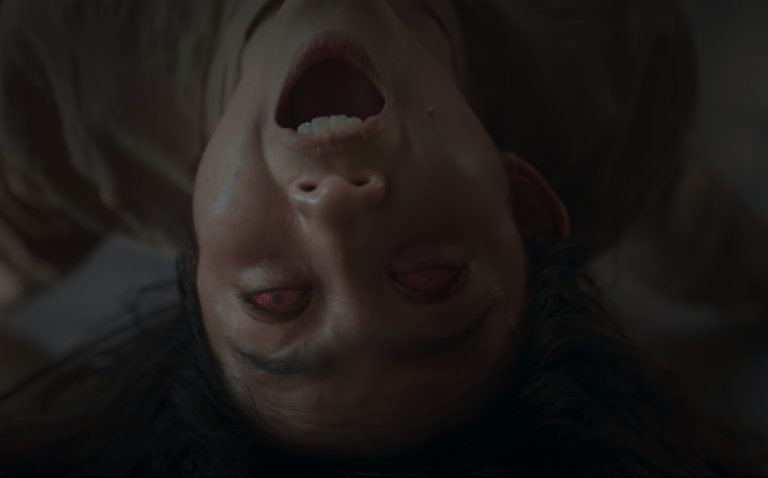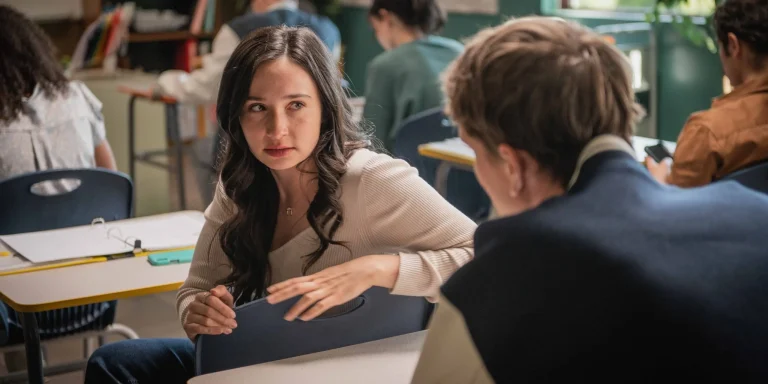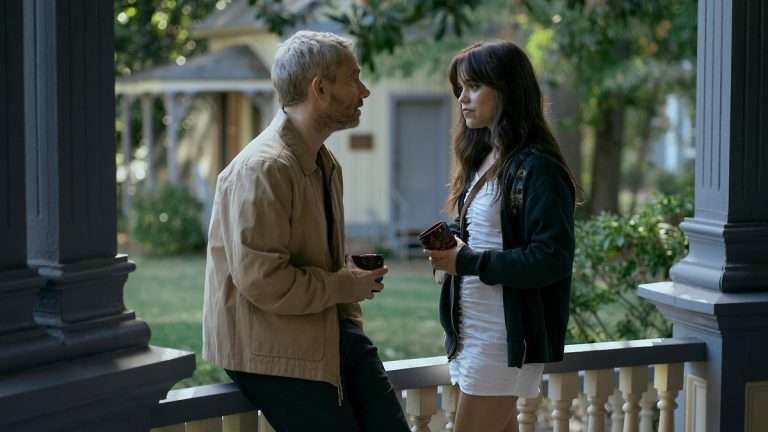Lucile Hadzihalilovic’s third feature film, ‘Earwig,’ is an adaptation of the novel of the same name by Brian Catling. It stars Paul Hilton, Roman Hemelaers, Romola Garai, and Alex Lawther. Hadzihalilovic conjures up a nocturnal dreamscape with flavors of horror and film noir in each moment through textured sounds and images. The impressionistic cinematography of Jonathan Ricqueborg makes it all seem like a fairytale that has started to decay. At the same time, the creepy, minimalistic music lulls us into a dream state, or to be precise, a quiet nightmare. Horror of this sort, poetic yet unsettling, is extremely rare.
Earwig (2022) Plot Summary & Movie Synopsis:
In an unnamed city in postwar Europe, Albert Scellinc looks after a young girl, Mia, in a desolate apartment. Mia does not speak and requires dentures. An elaborate and regular ritual of their mute, mechanized existence involves Mia putting on a headgear that collects her saliva in receptacles. Her saliva is then turned into makeshift teeth to aid the consumption of her aqueous meals by freezing it in casts made of her teeth. Mia has no toys and does not leave the apartment, her playthings being scraps of newspaper. She is fascinated by a painting in the apartment of a large mansion at dusk. Albert regularly listens to Mia by placing a glass on her bedroom door when she’s asleep. He receives phone calls from his mysterious ‘masters,’ asking him about the girl’s wellbeing, to which he has a stock reply as a reassurance. One day, during such a call, the master asks Albert to prepare Mia for the outside as it’s time for her to depart her cloistered life.
One night, Albert goes to a bar where he comes across a strange man who keeps claiming that they know each other but can’t quite put the finger on how. In his contemplation, he divulges various details about him, like how Albert lived in an orphanage, was a soldier and is a widower. Two other characters, Celeste and Laurence, who have their own storyline parallel to Mia and Albert’s, are present at the bar. When the stranger asks Albert if he has ever wanted to be someone else, followed by another question as to if he wants to be the barmaid, Celeste, which violently provokes him, breaks his bottle of beer and tries to stab the stranger, who seems to have foreseen this happening and instantly pulls Celeste in his defense, causing her face to get maimed.
In the attack’s aftermath, Laurence takes over the expenses of Celeste’s treatment. He is a rich, mysterious and oily young man whose intentions are vague at best. Following Celeste’s recovery, which leaves her with a large scar on her face, Laurence asks her to accompany him back to his home and live there with him. She obliges out of gratitude. Laurence has her tested for all kinds of venereal diseases, which further menaces his intentions toward her. On a walk one day with Laurence, she comes across Mia at a park, who is out with Albert as part of her acclimatization to the outside world. Mia, drawn by her own reflection in a pond, almost drowns by falling into it, and Celeste witnesses this from a distance. The beginnings of a strange, psychic connection that Albert and Celeste now share owing to that violent incident at the pub start to emerge.
Why does Mia start bleeding?
‘Earwig’ is hardly a coming-of-age film, yet there’s a strain of it in Mia’s arc. Her exposure to the outside world, breaking her away from her stringently routined life, starts to bring about changes that Albert did not foresee. Mia almost getting drowned in what is essentially a recreation of the tragic opening of ‘Don’t Look Now’, is the first thing she does that unsettles Albert. Mia starts to bleed from her face, a strange representation of the onset of menstruation yet, within the film’s dream logic, hardly an anomaly. Her dentures no longer fit her, which petrifies Albert and forces her to seek help from his master, something he seems petrified to do himself and therefore asks the concierge to do in his stead. A doctor soon arrives and replaces her frozen saliva with permanent glass teeth. All this happened due to her contact with what she had been seemingly sheltered from her whole life – the world on the outside.
It also marginalizes Albert’s importance in her life, which he clearly realizes, and sets him in a spiral. The freezing of her saliva into teeth was an essential duty of his, and the glass teeth now entirely rid her of this dependence on him. Her bleeding is a phenomenon that he never foresaw, thereby becoming a sign of her blossoming into someone he will no longer be able to keep under his control. The black cat that enters Mia’s life becomes a companion of hers, the only creature she can claim as that. Yet it’s exceptionally feral towards Albert, who even tries to kill it as if it were a demonic entity that has invaded their hermetic existence. The outside becomes a catalyst for Mia to start growing up and removing the shackles she is bound by in her life with Albert.
The female body
Mia’s bleeding ties into the film’s most prominent element, that of looking at the female body through its captivity and control. Albert is haunted by recollections of his wife’s pregnancy and seems terrified by the recollection of her giving birth. His entire job revolves around taking care of a young girl who may or may not be his daughter and keeping her within the confines of a space where she is supposedly safe. Her bleeding mouth, as mentioned above, signals the beginning of menstruation. This dramatically disturbs Albert, who becomes desperate for help as it ruins the image of a girl who was otherwise perfect till then.
Albert’s stabbing of Celeste is a moment that births a psychic connection between the two, yet is inherently violent and orchestrated by the stranger. Following her injury, Laurence seeks to help her through his apparent altruism. Yet he has her checked for sexually transmitted diseases, which shows his fear of her as a stranger, and then incipiently begins to control her. On the train in which they’re headed to his home, he holds back her medication from her and only gives it when she begs for it out of pain, treating it like some vulgar substance that needs to be kept out of her reach, her infirmity making her further subservient to him. Through such instances, the film shows the female body in two lights – as objects to be controlled and kept in their place, be it as a job or for unknown reasons, and its flux as the symbol of the loss of control.
Earwig (2022) Movie Ending, Explained:
After Celeste climbs back onto the train to see Albert, their psychic connection strengthens. She is offered a free drink in the same way Albert and the stranger were by her moments before she was injured, portending a similar interaction between her and Albert soon.
While Albert is having his final dinner with Mia, Celeste seems to be able to taste what he’s eating, and he, in turn, can sense her pain. This sensory exchange of experience suddenly turns Albert into his wife, Mary. She lovingly tries to approach Mia and given the earlier scene of her giving birth, and with Albert having no children, it’s a strong suggestion that Mia is Mary and Albert’s daughter.
What does the painting mean?
In a scene that seems to have been taken straight out of ‘The Poltergeist’, Mia moves her hand over the painting of a mansion that she seems struck by. This painting is a motif, appearing in strange places throughout the film. Albert is seen to have had this painting in his home as a child, and Celeste is seen with a version of it at her apartment. Each version of the painting is different in terms of color, the time of day it shows, and the overall mood. It visually clues us into the interlinked fate of these three characters. In one of the film’s strangest moments, Albert sees a shift in the painting in an agitated state from his worry because of Mia’s changes. On the steps leading up to the mansion’s door, a baby appears, as if abandoned and left there, only to then disappear upon closer inspection.
The mansion becomes the climactic location of the film, where all three characters’ fates intersect. Mia’s new guardians, the masters of Albert, live there, and it is there that he drops her off. As it turns out, one of them is the stranger from the bar though Albert is unfazed by the discovery. After handing Mia’s guardianship over, he tells the receptionist there that Mia isn’t his daughter. She hands over a birth certificate to him that clearly states Mia is his daughter, yet he confusedly calls it a lie.
As he leaves the mansion, he starts walking back toward it, imagining his dead wife, Mary, approaching him. As she gets close, we see that it’s really Celeste, who then stabs him in the same place he mutilated her but instead of getting angry or even screaming in pain, the two start violently kissing in a vampiric rapture. It might just be that Celeste does it to neutralize her pain through their psychic connection or to put the both of them on a level playing field in their physical experience. As the two kisses, the sky over the mansion changes, and the final wide shot replicates the composition of the recurrent paintings throughout the film. In Celeste, Albert finally finds a kindred spirit. At the same time, their connection makes the stranger’s words come true about him wanting to be someone else, possibly as an escape from his quiet, agonizing life.






